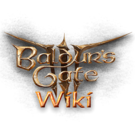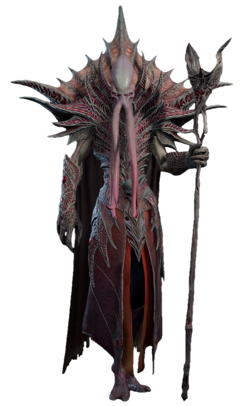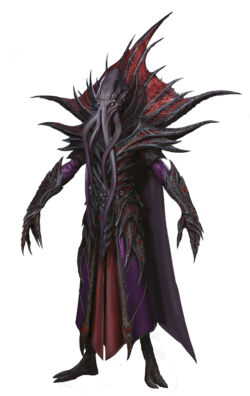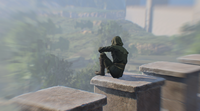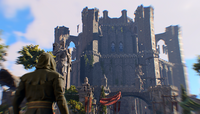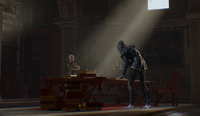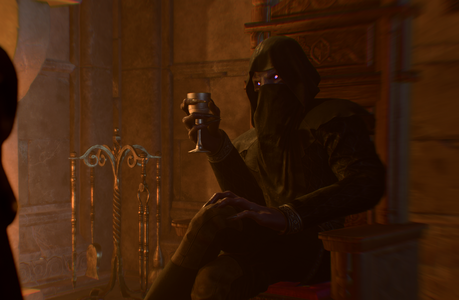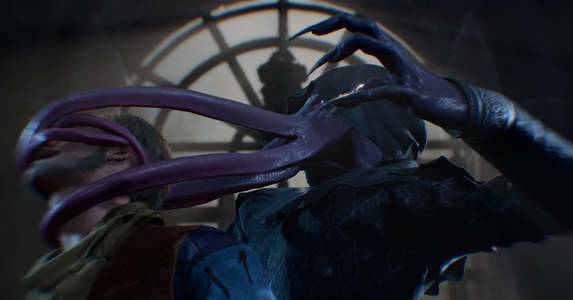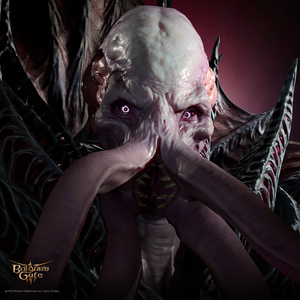More actions
The Emperor, is a Mind Flayer NPC that appears in Baldur's Gate 3. He plays a key role in the main story, but his identity is intentionally obscured until later parts of the game, allowing the player to ultimately decide for themselves if they want to know more about him, and whether or not he is trustworthy.
| The Emperor | |||||||
|---|---|---|---|---|---|---|---|

| |||||||
| Stats | |||||||
| Level 12 | |||||||
| |||||||
| [[Mind Flayer|Mind Flayer]] | |||||||
| Aberration | |||||||
| 140 | |||||||
| 18 | |||||||
| 30 ft | |||||||
| Medium | |||||||
| 120 lbs | |||||||
| 2 | |||||||
| Character information | |||||||
| Location | Astral Prism | ||||||
| Allies | Belyne Stelmane (Enthralled) | ||||||
| Enemies | Absolute, Ketheric Thorm, Enver Gortash, Orin the Red | ||||||
| Model | |||||||
| The Emperor | Combat | Dream Visitor |
Spoiler warning: The following content contains unhidden spoilers for Act 2. |
Gameplay
The Emperor can appear in multiple combat encounters, as a controllable ally, a neutral ally, or an enemy, but can never become a full member of the player's party or camp. He possesses a number of Illithid abilities commonly used by other Mind Flayers, and in some encounters will have other unique abilities with special functions.
Main Article: The Emperor/Combat
Identity
The Emperor plays a key role in the main story of Baldur's Gate 3, and as part of this role his identity and personal background are kept obfuscated for much of the game.
During Act 1 and Act 2, The Emperor only "meets" with the player as the Dream Visitor. At the beginning of Act 3, the player finally meets The Emperor "face to face", an event which reveals that he is a Mind Flayer.
Through all three Acts, The Emperor generally serves as a guide, and unlikely ally to the party, having the means to protect your mind from the influence of the Absolute through the use of the prisoner within the Astral Prism.
| “ | "Don't let my form decieve you. I am the one that's been protecting you. I am the one that came to you in your dreams. Help me. |
„ |
| — The Emperor, during Act 3 |
Personal History
Details about The Emperor's personal history are intentionally obfuscated during most of the game, but the player has the opportunity to learn more about him through conversations, interactions with other characters, reading books, and completing specific side quests.
![]() Act 3 Spoilers! This section reveals details about the story of Baldur's Gate 3.
Act 3 Spoilers! This section reveals details about the story of Baldur's Gate 3.
During this time, it also offers the party the Astral Touched Tadpole, which causes the user to transform into a Half-Illithid. It insists the path of the Mind Flayer is preferable, regardless of the player's view on them, This may seen contradicting with its previous promise as the Dream Visitor to ensure they do not become Mind Flayers, but this promise refers to the player becoming a Mind Flayer unwillingly because of the Elder Brain, The Emperor is in favor of the player becoming a Mind Flayer of their own volition and without the influence of the Elder Brain.
Over time, it reveals itself as formerly an adventurer, who sought out the Moonrise Towers, only to find a coven of Mind Flayers, becoming infected with the tadpole as a result. After it had broken free for the first time, it established a partnership with Duke Stelmane. It was discovered by Enver Gortash, and was once more put under the enslavement of the Absolute. It was only freed when he was ordered to retrieve the Mysterious Artefact, which led to his freedom once more, as well as its discovery of Orpheus, the Prince of the Comet, as named by the Githyanki.
The Emperor, however, does not disclose this information initially. He very carefully divulges the information he deems necessary, sometimes arguing that the player is not ready for the answer yet or that he will reveal specific information in the future. Should the party pursue, and find Ansur the Dragon, it will be revealed that the fact that it is Balduran, the founder of Baldur's Gate. Furthermore, Ansur the Dragon further reveals more information - as while The Emperor initially did not want to become a Mind Flayer, He now fully embraced his new form, and his comfort with this caused a rift between him and Ansur.
Ansur attempted to kill his former friend as the latter slept, (Ansur believed this would be a merciful death) - This attempt was felt by Balduran. In his struggle to protect himself from being murdered, Balduran killed Ansur in self-defence. After the confrontation with Ansur's reanimated body and subsequent fight, the Emperor reveals that, after securing enough money to fund the building of the Wall that led to Baldur's Gate founding, he felt the call of the sea once more. On the voyage, and following a shipwreck, Balduran made his way to Moonrise Towers, in search of fortune. There, the events unfolded in very much the way he had previously explained to the player: he discovered and was captured by a colony of mindflayers who infected him. As a record of his interrogation by Enver Gortash during the planning phases of the Absolute Hoax states, he spent ten years under the thrall of the Moonrise Elder Brain. His friend, Ansur, did bring him back to independent thought and free will.
After Ansur's death, Balduran came to be called the Emperor as he used his newfound psychic influence to rule Baldur's Gate from the shadows. For the next four centuries, he made his haven under the tavern of Elfsong, keeping various sentimental knick knacks such as his old dog Rascal's collar, his favourite recipe (fiddlehead soup), his first adventuring sword, or his mother's gifted cutlery set (the butter knife having been lost during his last shipwreck on the eponymous Isle of Balduran, inside the wreck of the Wandering Eye ship), but also more illithid-adequate items such as chains for his prefered prey - allegedly criminals and lawbreakers - and jars for brains.
During those four centuries, he also came to be associated with the Knights of the Shield, a lawful and neutral evil conglomerate of politicians and merchants manipulating events behind the scenes. Duke Stelmane was a major figure of this secret society.
Sometime before the events of the game, Enver Gortash and the Dark Urge captured the Emperor, and brought him back under the thrall of the Moonrise Elder Brain, now wearing the Crown of Karsus and having become the Nether Brain masquerading as the Absolute. The Nether Brain, as she admits to the player in the endgame section, sought to have all three Chosen of the Dead Three killed, and specifically picked the Emperor to lead a team of illithids on a nautiloid to search for and steal from the Githyanki the Astral Prism containing the Githyanki prince, Orpheus.
Interactions
See Dream Visitor to read about his previous conversations with the player when he was in disguise.
Players have a limited number of opportunities to interact with The Emperor, and as such, opportunities for conversation and other interactions are much more limited compared to the other primary Companions. Conversation scenes are available, but only occur during Act 3, after his "true" identity is revealed to the player, and all scenes[1] require a Long Rest to trigger.
Conversation Scenes
Known conversation opportunities with The Emperor currently include the following cases, but each scene appears to have multiple outcomes that affect the tone of all subsequent conversations.
Depending on the player's choices, the Emperor's behavior has many possible states. The more the player treats The Emperor like a "person", the more he will act like a person compared to other Illithids. The more the player treats The Emperor like a monstrosity with hostile intent, the more he will respond to the player with threatening language and visions of him acting like a hostile Illithid.
Identity Reveal
During Help Your Protector at the start of Act 3, a conversation is automatically triggered when the player ventures far enough into the Astral Plane. A combat encounter in some form is inevitable from this conversation, and then another set of conversation options are available after the combat resolves. The Emperor will have nothing further to say when this conversation ends, even if the player tries to interact with him further.[2]
Regarding Duke Stelmane
When the player first explores the Rivington area, being in proximity to certain characters or objects will "inform" the player about the recent death of Duke Stelmane. This will trigger a line of ambient commentary from The Emperor. The next time a Long Rest is triggered, the player may trigger a scene discussing The Emperor's reactions in more depth. Certain dialogue choices made during earlier conversations seem to disqualify the player from this scene. If the player does not long rest before completing the quest Visit the Emperor's Old Hideout, this scene will be skipped entirely.
On Conclusion of Visit the Emperor's Old Hideout
This scene may be available to trigger (by long resting) after the player completes the quest Visit the Emperor's Old Hideout.
Possible states for this scene appear to vary heavily depending on the player's choices in prior conversation scenes, with the general differentiating factor being the "attitude" the player appears to express towards illithids, and towards the Emperor, through their selected options in these prior scenes.
Romance
In terms of game mechanics, it is technically possible to Romance The Emperor. If the player chooses to reject his advances, The Emperor's attitude in conversation will change in a way that appears to be reactively appropriate to the way he was treated. For example, if the option "Absolutely not, you freak!" is chosen at any opportunity, The Emperor's treatment of the player takes a much more hostile tone in all future interactions.
![]() Romance Spoilers This section reveals details about romance and may contain mature themes.
Romance Spoilers This section reveals details about romance and may contain mature themes.
Players have a limited number of opportunities to interact with The Emperor, and as such, opportunities for romantically-styled interactions are much more limited compared to the other primary Companions.
If the player visits Crèche Y'llek prior to the start of Act 3, killing the Dream Visitor will subsequently lock the player out of romancing The Emperor, and from interacting with him in general.
There are many possible ways to interact with The Emperor in the available conversation scenes. It currently seems that the primary way to unlock "romantic" options is by choosing dialogue that generally treats The Emperor more like "any other person", and does not show explicit hostility towards his actions, or his Illithid characteristics.
The player does not need to accept the powers of the Astral-touched Tadpole to unlock this option. The Emperor seems to take offense to destroying the tadpole, but more testing is needed to determine if this has any effect on the available scenes.
The scene that occurs after completing Visit the Emperor's Old Hideout is generally regarded as the "primary" romantic scene. As long as the player is receptive to The Emperor's advances, conclusions to this scene will allow the player to engage in more intimate activities with him.
Conversation options that acknowledge this romance (after the primary scene has concluded) appear to exist in a limited number of places. For example, it is possible to tell Raphael "I don't want any part of this — the Emperor is my lover." during a specific conversation, if initiated after the romance scene has happened.
Engaging in the primary scene has no effect on other ongoing romances, even when romancing Lae'zel, who is generally hostile to illithids.
Endings
![]() Act 3 Spoilers! This section reveals details about the story of Baldur's Gate 3.
Act 3 Spoilers! This section reveals details about the story of Baldur's Gate 3.
While The Emperor is duplicitous, he appears to only think of survival, and prosperity. Should the player allow him to wield the Netherstones, he will follow through on destroying the Elder Brain, though with the cost of The Emperor "assimilating" Orpheus. He will mention he thought of controlling the Elder Brain, and becoming the source of the Absolute, but unless otherwise persuaded, will refuse on account that so long as the Absolute remains, they will be in an open war with the Githyanki, which is a war he is not certain he will survive. He will destroy the Netherbrain, and the parasites within its control in this ending.
It is also possible to persuade him to take control of the Netherbrain. In this scenario, he does not free the player or their party, making them mindless thralls, assuming absolute control of the party, and continuing the Grand Design.
However, if the player frees Orpheus, he will abandon the party, and side himself with the Netherbrain for the sake of his own survival - as he believes - or claims he believes - Orpheus may kill the party or be an ally to the party that helps kill the Netherbrain.
The Emperor can be attacked and killed when he first reveals himself to be a Mind Flayer. This will result in the influence of the Netherbrain taking over control of the party, ending the game.Achievements
Trivia
- The Emperor's existence confirms the Dream Visitor as being an Illithid influence, albeit in a different way.
- In the Early Access, the Dream Visitor was implied to be a mental manifestation of the player's tadpole, as it eased them towards using their powers more, as well as showing them a future of domination and control.
- In the Full Release, The Emperor plays a similar role, in the sense that he also encourages the player to expand their potential using the tadpole's power, but he is much more passive, in addition, his interests seem to be aligned against the Absolute
- In
 Baldur's Gate: Descent into Avernus, the segment describing Bellyne Stelmane describes her as having a secret, mental battle against a Mind Flayer. This Mind Flayer is very likely to be The Emperor himself, and as a result, puts his entire "alliance" with Belynne Stelmane into question.
Baldur's Gate: Descent into Avernus, the segment describing Bellyne Stelmane describes her as having a secret, mental battle against a Mind Flayer. This Mind Flayer is very likely to be The Emperor himself, and as a result, puts his entire "alliance" with Belynne Stelmane into question.
- If the Emperor truly is the Mind Flayer described in the 5e module, it's very possible they did not have a proper alliance at all, and rather, The Emperor enthralled her for his needs. Whether this was always the case, or if they had a genuine alliance beforehand, isn't fully clear as The Emperor is an unreliable narrator.
Gallery
Notes
This article has been proposed for deletion. Functionally replaced by new navboxes. Please discuss on the article's talk page. |
